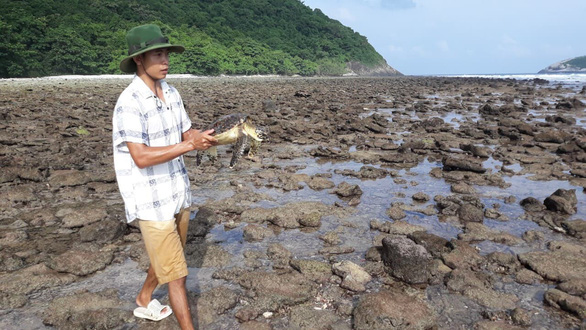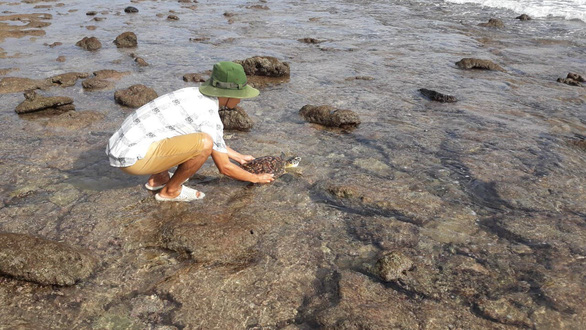A turtle of rare species was washed up ashore trapped in plastic waste on Con Dao Island, off the southern coast of Vietnam, on Thursday, before it was rescued by local park rangers.
The hawksbill sea turtle, weighing around five to six kilograms, was found stuck in plastic fishing nets at Con Dao National Park, according to the park management.
The park rangers immediately saved the turtle from the fishing nets and sent it back to the sea, Tran Dinh Hue, deputy director of the Con Dao National Park, said in a statement
The reptile would have died in the plastic waste had it not been saved on time, Hue added.
Hawksbill sea turtles are among rare and endangered species that are being protected, and are categorized in the International Union for Conservation of Nature’s (IUCN) red list for species being at highest risk of extinction around the world.
Prior to Thursday’s rescue, Con Dao National Park had also saved two hawksbill turtles and an olive ridley sea turtle since the beginning of 2019. Both are rare and endangered species listed in both IUCN’s and Vietnam’s red list.
The two hawksbill turtles saved by the national park at the beginning of this year were first found ashore by fishermen and were sold for money.
Fortunately, the buyers eventually brought the turtles to the national park, asking to have them freed back to their natural habitat, according to Le Xuan Da, an expert of the Con Dao National Park.
The olive ridley sea turtle, rescued last April, was also discovered stuck in fishing nets along with other plastic waste.
Such incidents are indicators of how dangerous waste in the ocean, mostly damaged fishing nets and ropes, are to marine life.
 |
| A park ranger releases the turtle back to the sea on Con Dao Island, southern Vietnam. Photo: Con Dao Park Ranger |
Con Dao, a district of the southern province of Ba Ria - Vung Tau, is home to many endangered and rare marine species.
Damaged and unusable fishing nets left behind by fishermen account for the most plastic waste in the ocean worldwide.
The management at Con Dao National Park cooperates annually with other local units to hold trash collecting activities, especially around the beach area.
Established in 1993, Con Dao National Park covers 19,998 hectares, including 16 islands and islets, 5,998 hectares of forest and forestland, and a protected area of 14,000 hectares.
Early this year, the park was recognized by the IUCN as an important zone to conserve marine animals.




















































